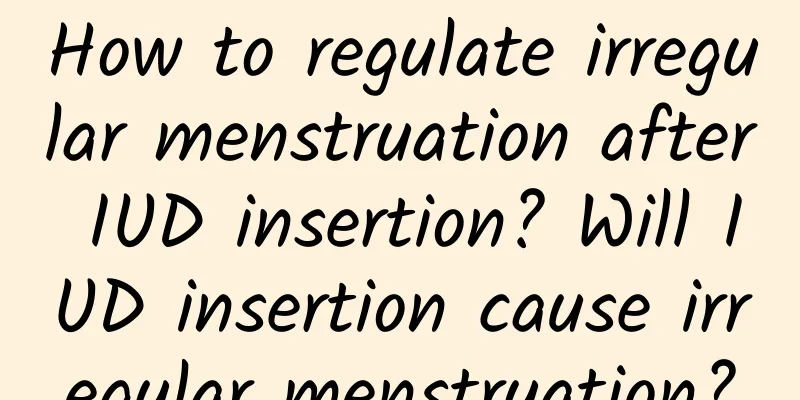How to regulate irregular menstruation after IUD insertion? Will IUD insertion cause irregular menstruation?

|
Neuroendocrine dysfunction, organic disease or drugs can cause irregular menstruation. Some women find that their menstrual period is not as regular as before and the amount is different after using the contraceptive ring. So will the ring cause irregular menstruation? Will the IUD cause menstrual irregularities? The IUD itself is a minor operation. A foreign body is suddenly placed in the uterus, and the body needs some time to adapt. The uterus may strengthen its own contraction to reject the foreign body. At this time, some mothers may not feel its presence, and some mothers may experience symptoms such as back pain, vaginal bleeding, and irregular menstruation. However, these adverse reactions will disappear automatically after a period of time. Bleeding after IUD insertion VS menstruation after IUD insertion Bleeding after IUD insertion: There will be a small amount of bleeding within 3 days after IUD insertion, which is less than the menstrual flow and generally does not exceed 7 days. However, if the menstrual bleeding after IUD insertion lasts for half a month and the blood is red, it is necessary to consider that the IUD may over-stimulate the endometrium. At this time, you must go to a regular professional hospital for examination in time. Menstruation after IUD insertion: Women usually menstruate one month after IUD insertion, but this is not absolute and varies from person to person. It is normal for a few women to have delayed menstruation after IUD insertion. Irregular menstruation: This is one of the most common symptoms of women after IUD insertion. Irregular menstruation after the IUD is inserted often causes excessive menstrual flow, prolonged menstrual period, irregular bleeding, etc. This situation will occur within about half a year after the IUD is inserted, and it will improve as the placement time goes by. However, irregular menstruation is not always caused by IUD insertion, and you cannot judge it by yourself. If the menstruation is delayed for more than ten days, it is recommended to go to a regular hospital's gynecology department for relevant examinations, take correct measures under the doctor's guidance, and deal with it in a timely manner. The main reasons for irregular menstruation after IUD insertion can be divided into two categories: 1. Intrauterine contraceptive device can activate plasmin in endometrial tissue, and this activated plasmin is not conducive to local coagulation function. Therefore, the enhanced activity of plasmin may be the reason for increased menstruation and irregular vaginal bleeding after the placement of the ring. 2. An inappropriately sized IUD may compress the endometrium and cause local tissue necrosis, as well as inflammatory reactions leading to irregular menstruation. The best time to choose an IUD for old friends The best time to insert an IUD is 3-7 days after the menstrual period ends. However, the following 3 situations are not suitable for IUD insertion. 1. People with heavy menstrual flow are generally not recommended to have an IUD because the IUD can increase the activity of fibrinolytic enzymes, which can lead to fibrinolysis and damage the blood coagulation function, thus increasing the amount of bleeding. 2. Irregular menstruation is often a symptom of various gynecological diseases. Therefore, if this symptom occurs, do not insert an IUD. Wait until your body has recovered before inserting an IUD. 3. Women who have symptoms such as irregular menstrual cycles and dysmenorrhea are not suitable for IUD insertion. At this time, barrier contraception can be used: including condoms, diaphragms, and cervical caps, also known as tool contraception, which plays a contraceptive role by isolating the combination of sperm and egg. Condoms should be the most commonly used and safest method, and can also prevent infectious diseases. Precautions for women after having an IUD inserted 1. There may be a small amount of vaginal bleeding and lower abdominal discomfort after placement, which will mostly disappear on their own; the main complication of placing an intrauterine contraceptive ring is bleeding. The main symptoms are excessive menstrual flow, prolonged menstrual period, irregular menstrual bleeding, etc. Generally speaking, there is always a small amount of bleeding after the ring is placed, but it will not exceed one week. If the bleeding exceeds one week, or the amount of bleeding is as much as the menstrual flow, it is an abnormal reaction. If there is heavy bleeding, abdominal pain, or fever, you should go to a medical unit for diagnosis and treatment; 2. Do not do heavy physical labor within a week; rest in bed within three days. Exerting too much can cause bleeding and inflammation. 3. Bathing and sexual intercourse are prohibited within half a month after the operation. 4. Within 3 months after placement, pay attention to less activity and avoid heavy physical activities, including walking around for a long time, sitting or standing for a long time, etc. If the menstrual flow is likely to increase, you should pay attention to whether the contraceptive device falls off during menstruation. Do not have sex or take a bath in a tub if there is vaginal bleeding. 5. If any of the following situations occur, go to the hospital for diagnosis and treatment immediately: severe abdominal pain, fever, pelvic pain, increased vaginal discharge; menstruation has not stopped or there is a possibility of pregnancy; the IUD falls off; pain during sexual intercourse; excessive bleeding or irregular bleeding or bleeding that does not stop, etc. |
Recommend
What is the sonographic appearance of uterine fibroids?
Uterine fibroids are a common gynecological tumor...
Are cervical warts easily contagious to others?
Are cervical warts contagious? Cervical warts are...
Why is cervicitis always difficult to cure? What complications can cervicitis cause in women?
Some women who have cervicitis actively go to the...
We will mainly analyze the early symptoms of ectopic pregnancy that often occur for you
Among the many diseases of women, ectopic pregnan...
How to care for cervical warts after surgery
In order to completely cure cervical warts, profe...
Symptoms that often occur in patients with ectopic pregnancy
What are the symptoms that patients with ectopic ...
What complications may pelvic inflammatory disease cause?
Pelvic inflammatory disease is a type of gynecolo...
Which hospital is better for painless abortion?
Which is the best hospital for painless abortion?...
What are the symptoms of uterine fibroids?
The uterus is a fertile place that produces menst...
Are these 3 foods more nutritious after sprouting? One picture will tell you in seconds: eating this way can improve immunity and help metabolism
Even if the potatoes at home have sprouted, you a...
Medicinal Diet for Women with Amenorrhea - Boiled Eggs with Chuanxiong
[ Introduction] Amenorrhea is a common symptom of...
Typical clinical symptoms of vulvar leukoplakia
Gynecological diseases are extremely harmful to w...
Is cervical erosion hereditary?
Cervical erosion is a common gynecological diseas...
What to do if you get uterine fibroids after induced abortion? How to treat uterine fibroids after singing?
Induced abortion is a risky surgical method. If t...
What is CrossFit?
CrossFit originated in the United States. Since i...









